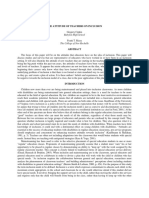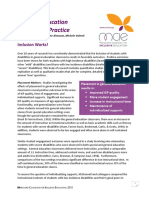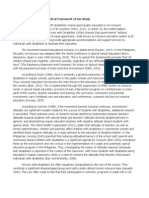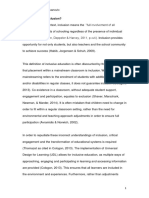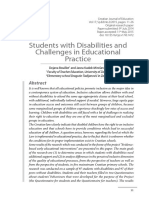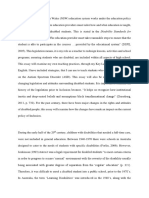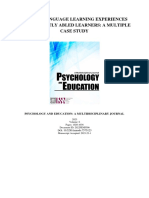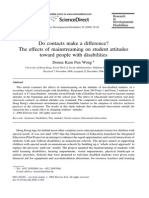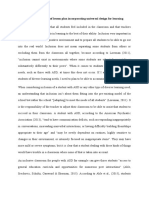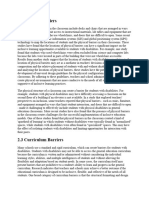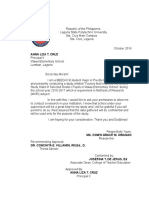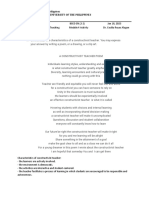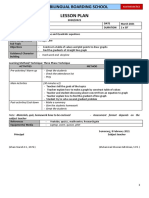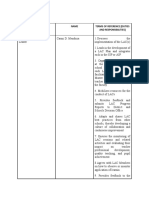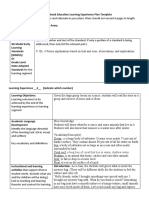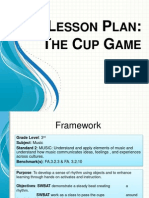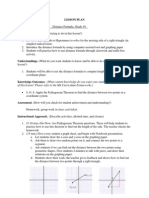EFFECTS OF MAINSTREAMING OF A GRADE 6 DEAF STUDENT
OF BAY CENTRAL ELEMENTARY SCHOOL
A Research Paper
Presented to the Faculty of
College of Teacher Education
Laguna State Polytechnic University
Main Campus
Santa Cruz Laguna
In Partial Fulfilment
Of the Requirement for the Degree of
Bachelor in Elementary Education
Major in Special Education
DYRA JANNEEN PEROLINA PARDUCHO
September 2016
�Chapter 1
The Problem and Its Background
Introduction
Mainstreaming is the process of placing a child with special needs in
regular classroom in order to address the requirement of the Public Law 94142, published by the Congress in 1975 that requires all children be educated
in the least restrictive environment (LRE). Mainstreaming has an inclusive
approach that has the primary advantage of providing a natural, real-world
environment where life skills are learned.
Background of the Study
Mainstreaming, also sometimes called partial inclusion, is done
during specific times of the day based on the skills of the student with special
needs where they receives education with the general education and some
portions of their time, the students with special needs may be receiving
instructions in a special education classroom or resource room.
There are lots of debates of thoughts in different articles about
mainstreaming. Many say it is good to develop the social skills and help the
learning process of both the student with special needs and his/her nondisabled peers. Some thoughts students with special needs will only inhibit
�the academic learning of regular students and some says it wont affect the
regular students in their academics. There are even parents of regular
students who disagree to the mainstreaming because they says that their
child might adopt the characteristics of the student with special needs and on
the other side, the parents of the SPED student are afraid that their child
might only be bullied by other children.
In the Philippines, children with special needs usually suffer
discriminations and the society still lacks the awareness about these children
with special needs. There are many people who are very less educated or
totally lacks of knowledge about these children with special needs. The
researcher even experience seeing regular students making fun of a deaf
student because she cannot hear them. Because the society lacks knowledge
about these children with special needs, people deems that these children
cannot do anything and are being secludes away from the society. Some
parents even feel ashamed that they have a child with special needs.
The Department of Education (DepEd), through the support of National
Council on Disability Affairs (NCDA) and the Philippine Association of
Children with Developmental Learning Disabilities, Inc. (PACDLD) conducts
awareness-raisings campaigns that include seminars for teachers, parents
and students with special needs that focus more in inclusion education. This
starts to open public and private schools to accept children with special needs
to mainstream to regular classroom.
�The researcher conducted this study to determine the effects in the
development of mainstreaming to chosen student with disability and to his
peer in regular class. The researcher also aims to show and raise awareness
to the effects of mainstreaming focuses to a Grade 6 deaf student and wants
to prove that the mainstreaming has a positive outcome to both the student of
special education class and his peers in regular class.
Theoretical Framework
In Vygotzkys Social Constructionist View on Disability, as cited by
Robina (2007), contemporary scholars from all over the world tends to
promote an educational model in which borderlines between ordinary and
special education tends to be less distinctive almost to the degree of
extinction. Vygotzkys general theory of child development Cultural-Historical
activity Theory (CHAT), and his theory of dysontogenesis (distorted
development theory) leads to the process of practicing inclusive education
that strengthens and empowers the individual skills of the child rather thyan
giving stress to the weakness or deviations. According to him, the main object
of special education is not only to compensate major disabilities through
developing and strengthening psychological functions, but also to prevent,
rescue and heal the second level of disability through psychological and
educational methods. Lev Vygotsky thinks that, effective rehabilitation should
apply appropriate and timely methods to educate, strengthen and
compensate their cultural and psychological functions, communicational
�ability and social relationship. Vygotsky also proposes we should adopt
positive classifying methods to assess disabled children, and to measure
disabled children from the perspective of strengthening is more appropriate
than merely from the perspective of disability.
According to Vygotzky as cited by Kovacevic (2012) children with
disabilities are only one category of children with special needs.
Terminological equalisation of a child with special needs and a child with
disabilities is an attempt to avoid stigmatisation and any form of discrimination
of this category of children. In this way, attention is drawn to the need for
functional assessment of physical and mental status of the child, in order to
define both damaged, and preserved functional capabilities of a child,
including the family situation, as well as the relationship to the wider
environment. The existence of certain limitations in the functioning of the
disabled child points to the need to seek different, special ways, which would
compensate for the shortfall and encourage the development of his
personality. This is so because the specificity of development of the disabled
child is not reflected in the fact that it does not possess many features that
are present in a child with normal development, but in the fact that the
disturbed balance of adaptive functions, the entire system of adaptation that
seeks new balance, is reorganised according to the new principles. The
boundaries of the new and different organisation of psychophysical
development are determined by the social environment under whose strong
�influence the disabled personality develops and strives to achieve the
common normal status. This is why disability turns into 33 a handicap when
the present impairment becomes a sum of personal and social consequences
of the impairment or when it receives a social character. What occurs then is
a discrepancy between the achievement or condition of an individual and the
expectations of a certain group to which he belongs. The handicap thus
becomes a social phenomenon that indicates the social and environmental
consequences for the individual arising from the impairment.
Conceptual Framework
The conceptual framework of the study is depicted in the research paradigm
below:
Independent Variable
Dependent Variable
Mainstreaming of a grade
6 deaf
Effects
of student
mainstreaming to the deaf student and to his peers in regular class
Peer acceptance
Socio-cognitive skills development
Learning condition
Academic performances
Frame 1
Frame 2
Figure 1: Research Paradigm of the Study
�For better understanding, the Conceptual Framework is presented in
the paradigm above which consist of independent and dependent variable.
Frame 1 shows that independent variable refers to the mainstreaming of a
deaf student in a regular class in terms of peer acceptance and learning
condition while frame 2 reflects the dependent variable which refers to the
effects of mainstreaming to the deaf student and to his peers in regular class
in terms of their socio-cognitive
skills development and
academic
performances
Statement of the Problem
The main purpose of the study was to determine the effects of
mainstreaming of a grade 6 student of Bay Central Elementary School
Specifically, it sought answers to the following questions.
1. What is the level of mainstreaming of a Grade 6 deaf student in terms of:
1.1. Peer acceptance
1.2. Learning condition?
2. What is the effect of mainstreaming to a deaf student and to his peers in
regular class in terms of:
1.1 Social skills
1.2 Cognitive development
1.3 Academic performances?
�3. Is there a significant effect of mainstreaming of a grade 6 deaf student to
those students in regular class in terms on the individual performances?
Hypothesis
There is no significant effect of mainstreaming of a Grade 6 deaf
student of Bay Central Elementary School.
Significance of the Study
Hopefully this study will eventually help the following:
Students. This may help students in general education and in special
education to break the discrimination barrier towards better socialization
between regular students and students with special needs and also in
building acceptance. This may also serve as a guide to encourage their
children to personally involve in learning without the discriminations between
them.
Teachers. This may help them, both the regular teachers and the special
education teachers to think more strategies and techniques in teaching the
students with special needs in mainstream and to help them learn with their
peers in regular class with teamwork and without biases.
Administrators. This may help them to analyze or to think new modification
in the curriculum to suits the needs of the students with special needs in
�mainstreaming. This may also help them to guide the students to understand
the material in any way.
Parents. This may help in opening awareness and acceptance of the parents
to mainstreaming and to have their support all the time. Parental involvement
is essential, parents and members of the family must express their support, it
will give a positive insight for the students to study well.
Future Researchers. This may serve as their reference for further studies.
The findings will give insights to the researchers for them to have a second
look to conduct another study of the same nature with additional variable may
be conducted by the future researchers to determine the reliability of the
result of the present study.
Scope and Limitation of the Study
This study focuses on the effects of the mainstreaming of a Grade 6
deaf student of Bay Central Elementary School S.Y. 2016-1017. This study
will only focus to the deaf student and to his peers in regular class and to their
development in socio-cognitive skills and academic performances.
Definition of Terms
In order to have clearer understanding of thesis study the following
terms are hereby defined;
�Administrator. A person whose job is to manage a company, school, or other
organization
Children with special needs. They are the children with disabilities or gifted
and talented children that usually needs more attention in teaching them to
their learning and developments.
Contemporary scholars. Scholars in historical or indefinite time periods
Deviation. The action of departing from an established course or accepted
standard
Disability. A physical or mental condition that limits a person's movements,
senses, or activities.
Dysontogenesis. Pertains to defective embryonic development
Inclusion. A process of including a student with special needs in a regular
class if the student is already capable of learning in the regular class.
Mainstreaming. A process of placing a student with special needs in a
regular class in a particular periods depends on the skills, and behaviors of
the student who will be mainstream.
Resource Room. A separate, remedial classroom in a school where students
with educational disabilities, such as specific learning disabilities, are given
direct, specialized instruction and academic remediation and assistance with
homework and related assignments as individuals or in groups.
�Socio-cognitive skills. The thinking and socialization abilities of the student.
Special Education. A form of learning provided to students with special
needs, such as students with learning disabilities or mental challenges.


